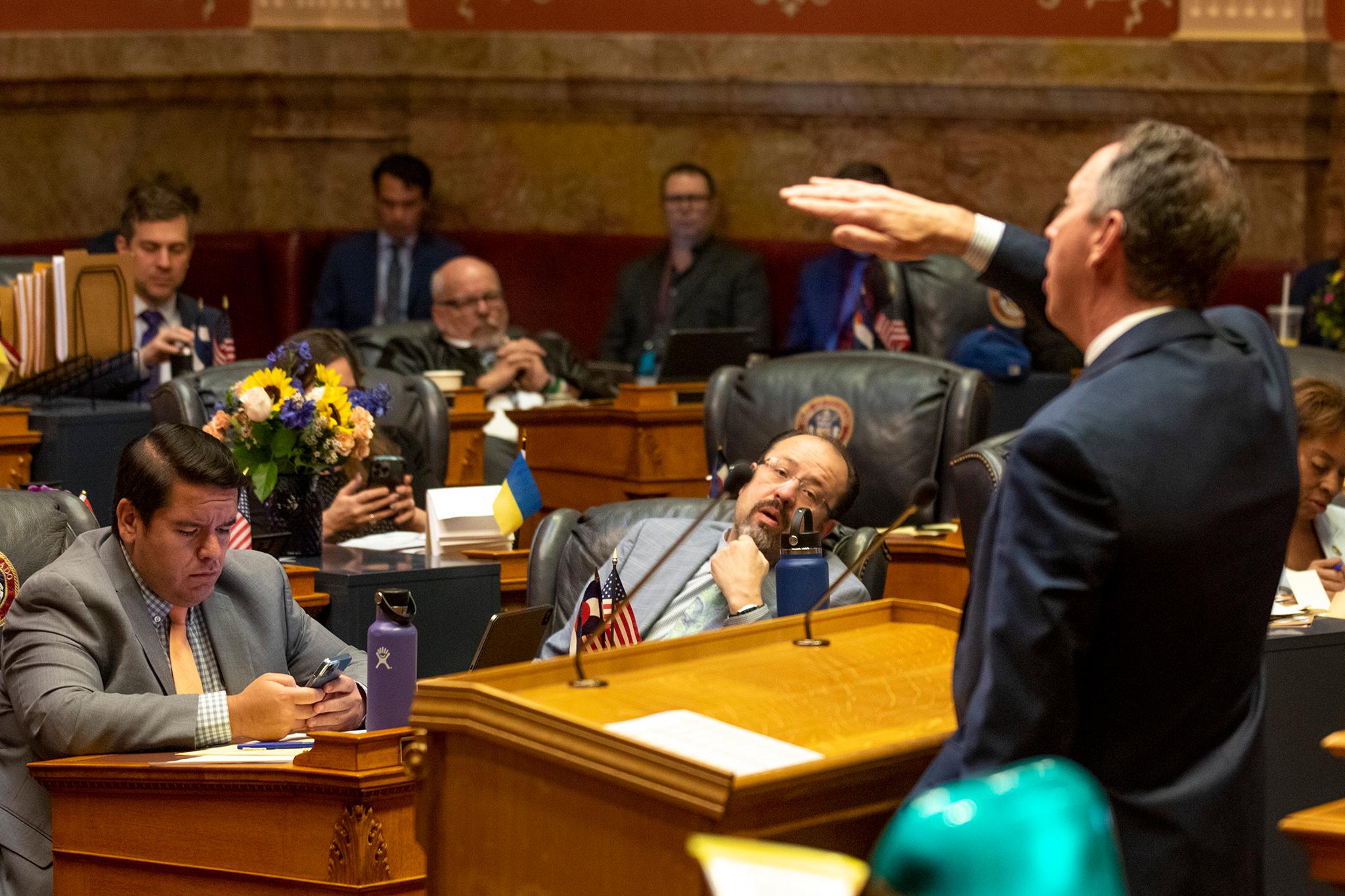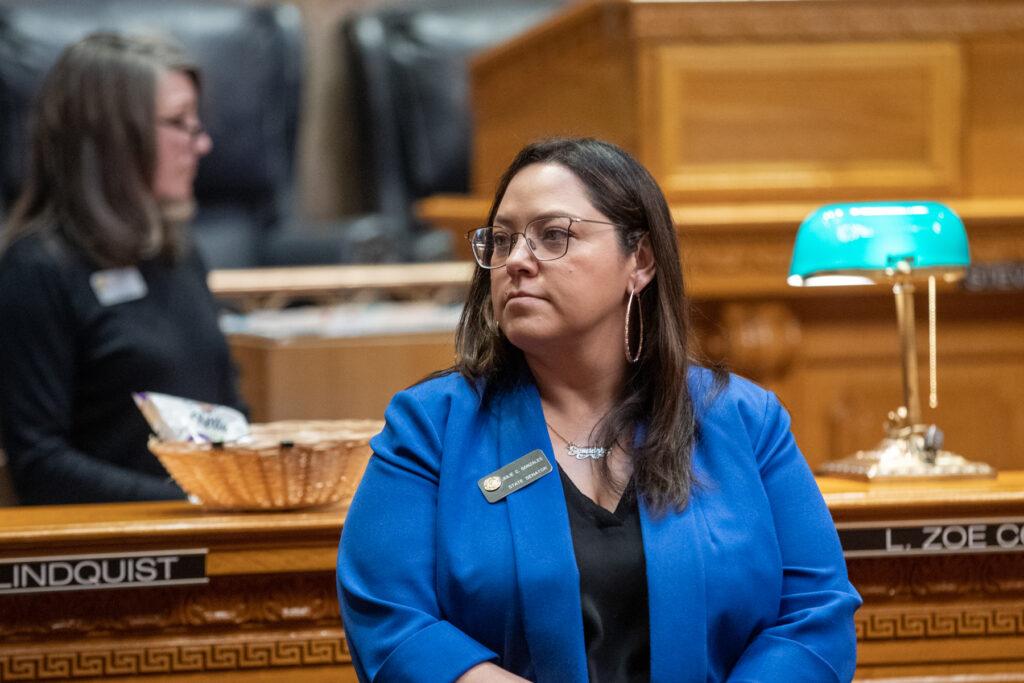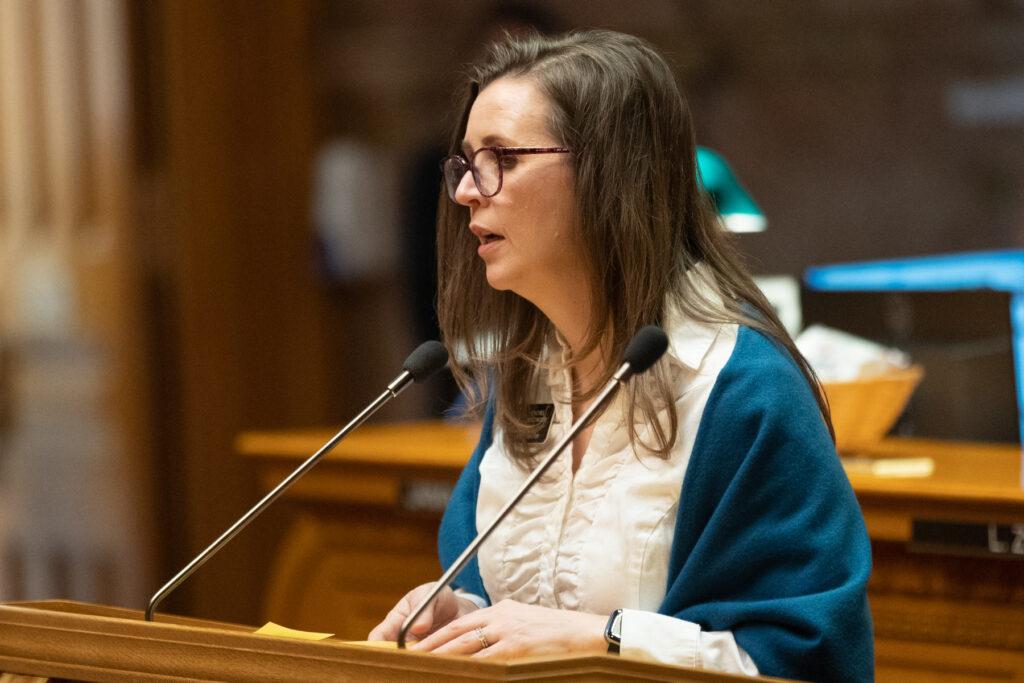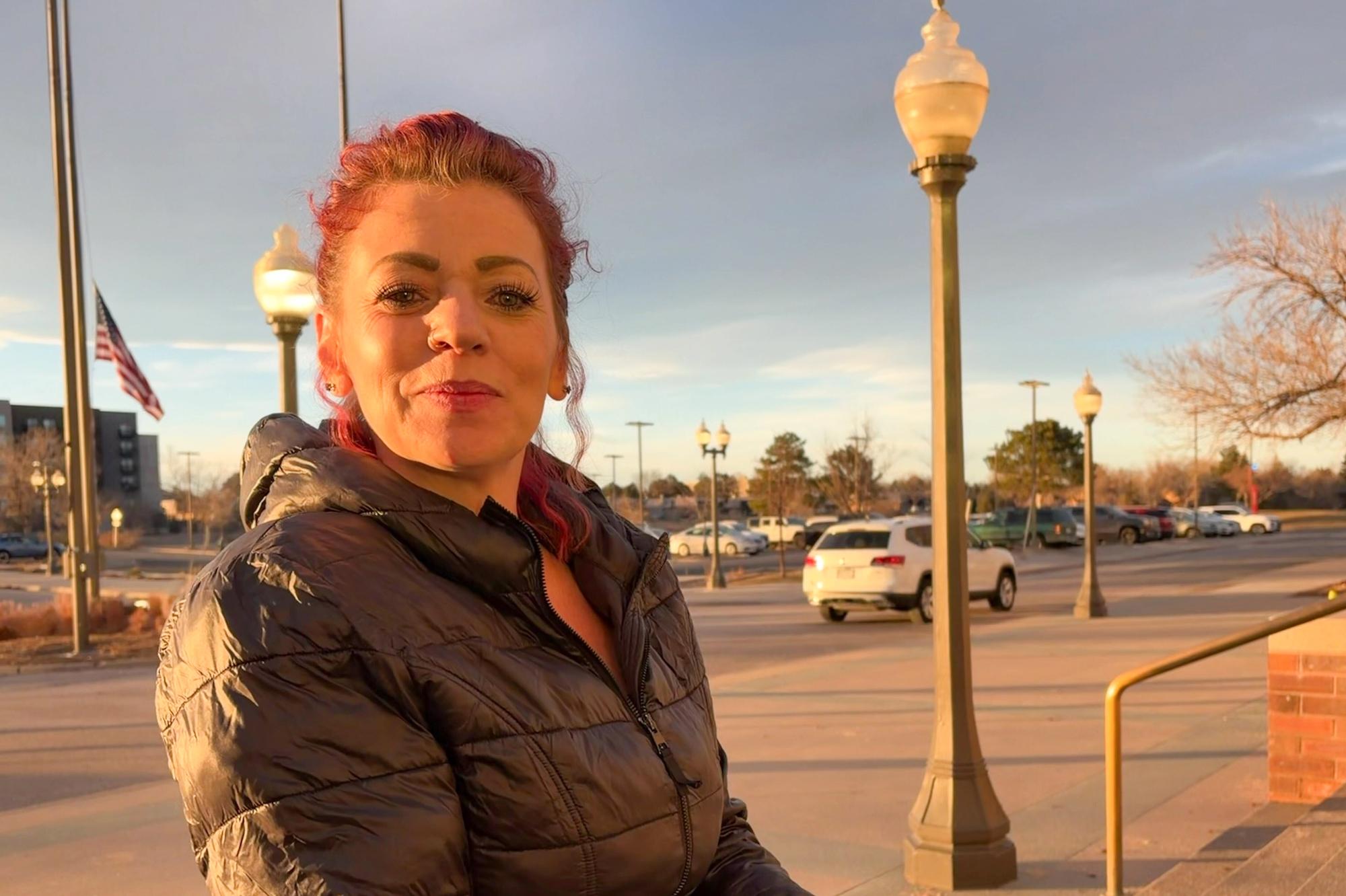
The message from the leader of the Senate was clear: The land-use bill was going to pass.
Sure, Gov. Jared Polis’ top priority had divided Democrats, inspired fiery resistance from property owners and been thoroughly rewritten over the course of its legislative journey. But one way or another, the bill was on track to pass — so some of its backers said.
Even on the last day of session, with less than 10 hours remaining before lawmakers were legally required to adjourn, Senate President Steve Fenberg told reporters that the bill would soon head to a crucial last step.
And yet that never happened. Hour by hour, no news came. The sweeping proposal — which was meant to change how Colorado manages growth — languished in the Senate. When lawmakers officially gaveled out a few hours before midnight, SB23-213 was dead.
So, what happened? Based on extensive interviews, CPR News has put together a picture of the measure’s final hours — and the forces that doomed it.
Well before the end, the bill had endured a gauntlet of opposition from local elected officials and property owners, who helped to turn suburban Democrats and others against the measure.
And with Republicans united in their opposition, Democrats needed most of their members on board to get the bill through. But in the final chaotic hours of session, as tempers flared and time grew short, it lost the support of more Democrats, including Denver progressives.
Ultimately, the marquee effort ended with an unusual defeat — a result that Democrats have variously blamed on a rushed process, backlash from city leaders and property officials and a strained relationship between the governor and some lawmakers in his own party.
What divided Democrats?
Part of the bill’s challenge was obvious. The governor wanted to partially override local control of development rules, declaring that cities would have to allow somewhat denser development in certain areas. That idea had inspired fierce resistance from city leaders and property owners, even in Democratic areas.
Suburban Democratic senators listened, with some saying for weeks that they were opposed to or deeply concerned about any preemption of local authority.
“Serving on city council before I [was elected to the legislature], I believe in the value of local government and local control,” said state Sen. Kyle Mullica, one of the skeptical Democrats.
State Sen. Rachel Zenzinger of Arvada was a key opponent of the original bill. She said that long before the final day arrived, she had secured an alliance of at least six Democratic senate votes — the magic number to ensure the bill could not pass in a form that preempted local control.
“That was the core from the beginning,” Zenzinger said. “It wasn't about killing the land use bill, it was never about killing the land use bill. It was about recognizing that we needed a bottom-up approach, not a top-down approach.”
Zenzinger declined to list those allies, but a number of senators have expressed some degree of skepticism about the idea of preemption. In addition to state Sen. Mullica of Thornton, they include state Sens. Joann Ginal of Fort Collins, Chris Kolker of Littleton, Jeff Bridges of Greenwood Village and Robert Rodriguez of Denver.
Facing that kind of skepticism, the Senate had earlier passed a stripped-down version of the bill that did not include any mandatory upzoning and instead mostly encouraged communities to plan for growth. Meanwhile, the House passed a more sweeping version that did preempt local authority.
Ultimately, the bill’s fate rested with the Senate, where the sponsors — and the administration — were left with two options.
They could have stuck with the stripped-down Senate version and insisted the House join them. Or they could try to unify the rest of the Democratic caucus and negotiate a version that achieved more of the governor’s original vision.
They chose the second option, with Senate Majority Leader Dominick Moreno bustling around the Capitol for days as he tried to pull together 18 lawmakers who all had their own issues and concerns. Getting there would require winning over at least one of the six opponents that Zenzinger believed backed her.
“There was a lot of shuttle diplomacy in the last days,” Moreno said.
It appears to have been an uphill battle. As the final hours of session approached, more Democrats turned against the stronger version of the bill, sealing its fate.
Among them was state Sen. Julie Gonzales, a Denver Democrat. She had previously voted in committee for a version that included mandatory upzoning. But she ultimately told leadership that she would instead support the de-fanged Senate version, if anything.
“Ultimately, we ran out of time for us to get to a meaningful consensus between the version that had come out of the Senate and the version that had come out of the House,” Gonzales said. “I thought that they were too far apart for us to be able to legislate with intention and really craft a meaningful structural policy shift to address the housing crisis.”
The discussions were strained even further by battles over other legislation. Just hours before that final frantic day, another proposal sponsored by Gonzales — a measure to guarantee “just cause” eviction protections for renters — ran out of time to pass the Senate.

When asked whether the fate of the evictions bill had influenced her decision on the land-use bill, Gonzales responded by describing all the collaborative work she had put into the land-use bill — only to be met by what she perceives as the governor’s heavy hand on other issues.
“I dug in hard. I cannot tell you how many hours this session I spent in conversation with my constituents, with my community, working on amendments, trying to work with my colleagues, preparing language to make this [land use bill] something that would be workable and real and beneficial for the folks in my district and my community,” she said.
She continued: “And yet what I get told time and time again is, on a whole host of other bills, is … ‘Great idea. Thank you so much for moving the conversation forward. You know, better luck next time.’’”
While Gonzales’ decision was a setback for the sponsors, Zenzinger said the idea of mandatory upzoning was already doomed. By the end of the final night, she said, several more Democrats were ready to put the measure to rest and focus on other final bills.
The Senate still could have moved forward with its previous, stripped-back version of the bill, but there seemed to be little appetite for that.
“I think the sponsors just said, ‘We don't want to settle for something that didn't have some real solidness to it,’” said Democratic state Sen. Sonya Jaquez Lewis, who supported the idea of mandatory upzoning.
The stalemate in the Senate left other Democrats frustrated. State Rep. Steven Woodrow was a House cosponsor of the land-use measure. He said that Senate lawmakers tried to use land-use negotiations to gain leverage on other issues.
“I think some were maybe hopeful, knowing it was an administration priority, that they could maybe get some pressure exerted in the Senate,” Woodrow said. But he said that the roadblocks to bills like just-cause evictions came from the Senate itself, not the governor’s office.
“It was the Senate that needs to work that out,” he said. “I think with more time, with more one-on-one attention, we can get there.”
Where did the time go?
Jaquez Lewis said that the bills were caught in the-end-of session vortex. The situation was made even more difficult because Moreno was pulling double duty as the shepherd of the land use bill and the manager of a hectic Senate calendar, she said.
“That's difficult for anyone to try to negotiate,” she said. “It’s nothing against Majority Leader Moreno — it was just the timing. … You’re down to the final weekend and, gosh, we had at least 10 big bills [outstanding.]”
State Sen. Dylan Roberts, who also supported a stronger version of the bill, said that it was tough to pass such a broad policy in just a couple months.
“The land use bill is probably one of [the biggest], if not the biggest bill that I've ever seen in my legislative career,” Roberts said. “That level of impact was unique, but one of the main reasons why this bill didn't advance this year is that it just ran into the calendar. It got introduced fairly late in the session. And then, it was going alongside some other really big things that were happening late in the session, like property tax.”
Bridges said that while he had been open to a stronger version of the bill, the hour grew too late for intense negotiations on a huge bill.
“If proposed compromise language had been shared Friday or even Saturday morning, we might have found a way forward that still had some form of transit-oriented development or possibly even ADUs,” he wrote in a text to CPR News. “In the end, the bill could have passed, but not without sharing proposed language, and not with a conference committee request coming the last day of session with no clear sense of the outcome.”
Similarly, state Sen. Janice Marchman, a Democrat, said she would have supported some degree of preemption, such as forcing cities to allow accessory dwelling units, but felt there wasn’t enough time to do it right.
“Just the timing was what got us there,” she said.
The Polis administration argues that the bill wasn’t rushed, pointing to hundreds of meetings it conducted from July 2022 through May of this year. In response to a records request, the governor’s office provided a list of some 350 meetings that his team conducted after his re-election as they planned the land use proposal, as well as several dozen earlier in 2022.

The meeting participants ranged from groups like Colorado Municipal League to housing advocates and representatives from numerous cities. Gov. Polis himself was scheduled to attend at least 21 of the meetings, the records showed, including with Denver Mayor Michael Hancock and powerful figures like Kent Thiry, the former head of Davita who is now a major funder of political causes.
“It wasn't that they weren't listened to. It was maybe that they disagreed with the approach,” Moreno said of the bill’s opponents.
Still, some local elected officials said they had been left out of the process, or that they were only included once the bill was introduced.
“None of the councilors and people who were dealing with zoning stuff in the county had been met with. It was kind of excessively rushed,” Rodriguez said.
So, what’s next?
All indications are that land-use policy will return to the capitol next year — although some of the biggest ideas from this year’s bill could be split into different measures.
“I think we need to start the process early. I think there were a lot of folks who, at the end, actually really liked some of the principles,” Rep. Woodrow said. “We’ve got to reach senators and explain to them why this is good for their constituents, even if some of their mayors or city council folks are going to [oppose preemption] ‘til the end.”
Kevin Bommer, the executive director of the Colorado Municipal League, said he was open to a “collaborative discussion,” especially about affordable housing — but warned that including preemption among the proposals would start the war all over again.
“What I saw this session was the most significant grassroots municipal and county response to any legislation in my nearly 24 years of working at the Colorado Municipal League,” he said. Any assumption that there would be less resistance to local preemption next year would be “unfortunate,” he added.
Earlier this month, Polis’ office declared that the governor would “continue his fight to better protect the property rights of homeowners and make Colorado more affordable to purchase or rent homes because changing the status quo isn’t easy.”
Meanwhile, housing reformers are asking what this year’s failure means for Colorado’s housing politics.
“It's definitely a tough loss,” said Matt Frommer, who worked on the bill with the environmental nonprofit SWEEP. “From my perspective, it's just a huge policy failure to come away with nothing.”
Eric Budd has fought for years on housing issues in Boulder, where the city council in recent years has become more accepting of density and development. He said the key in Boulder has been to circumvent “NIMBY” objections by building a new political base, rather than trying to win over their staunchest opponents.
“We need people that are going to say yes to housing, and [we need] people that are really going to push forward the change that we need,” he said. “How do we organize the people that will fight for housing?”
Woodrow said that he may start holding meetings about next year’s efforts in a matter of weeks.









